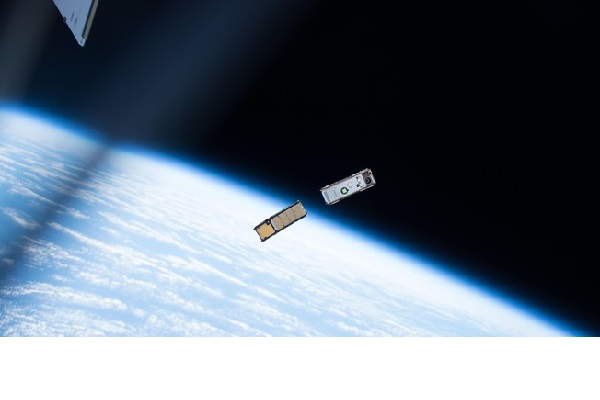This past week, 28 CubeSats were released from the International Space Station (ISS). Eight of them are running EPFL software that was originally developed for SwissCube.
Code name: QB50. This refers to the European research program begun in early 2016 with the aim of launching 50 miniature satellites – CubeSats – into orbit around the Earth. Their mission: to observe and measure the thermosphere, which is the layer of the atmosphere from 100 to 600 kilometers above the Earth’s surface. Research institutes and universities from 23 countries are involved in the project, and their attention was focused on the skies this past week: on Monday, the ISS began launching the CubeSats that they developed.
Seven years ago, EPFL sent the SwissCube into space. That was the first Swiss satellite, and it was designed and built by students. EPFL may not have a satellite on board this time around, but it is involved in the control systems of eight of the 28 satellites that entered orbit this past week. “We developed satellite control software for SwissCube – called simply Satellite Control System (SCS) – that is extremely lean and sturdy,” says Muriel Richard, from EPFL’s Space Engineering Center (eSpace). “Using a secure and automated process, SCS encodes the instructions that need to be sent to the satellite, transmits them when the satellite is flying over a base station and receives information back from the satellite.”
Eight organizations from seven different countries – Turkey, Taiwan, South Korea, Israel, Spain, Ukraine and China – chose EPFL’s open-source software, which they adapted to their own needs. “This is extremely positive and a real boost for our work,” says Richard, who noted that SCS is also able to control larger satellites.
EPFL’s software has been chosen for other ongoing projects as well. It will run CleanSpace One, a satellite that is being designed to de-orbit SwissCube so that it does not end up as more space debris. It will also control the first two prototypes of a planned constellation of 60 nanosatellites; the prototype launch, scheduled for next year, is being run by EPFL startup ELSE. These projects are helping to put EPFL at the center of a growing ecosystem of specialized space-related expertise























